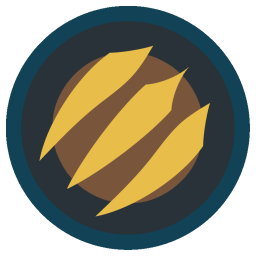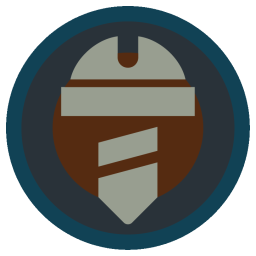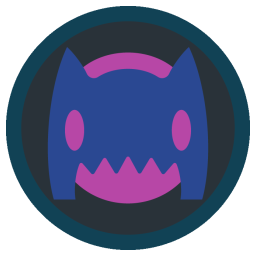Difference between revisions of "Monster Classification"
From SpiralKnights
Leafblader (Talk | contribs) (Added Treasure and Baby Mimic, fixed Lichen Colony classification) |
Leafblader (Talk | contribs) |
||
| Line 71: | Line 71: | ||
* ★ {{Monster_Icons|Slime}} [[Sloombargo]] | * ★ {{Monster_Icons|Slime}} [[Sloombargo]] | ||
* ★ {{Monster_Icons|Undead}} [[Deadnaught]] series | * ★ {{Monster_Icons|Undead}} [[Deadnaught]] series | ||
| + | * ★ {{Monster_Icons|Undead}} [[Black Kat]] | ||
| + | * ★ {{Monster_Icons|Undead}} [[Grim Scarab]] | ||
| + | * ★ {{Monster_Icons|Undead}} [[Grim Gourdling]] | ||
==Turret== | ==Turret== | ||
Latest revision as of 16:36, 15 June 2020
Most Monsters found in the clockworks can be classified into 9 different categories depending on their battle style and power: Drone, mini, grunt, brute, elite, giant, turret, support, and boss.[1]
Most monsters can spawn randomly in the Clockworks alongside other monsters in their class based on the level type. Some monsters are not in the normal rotation and can only spawn under special conditions, such as an event or only in a specific level set; these are marked with a ★ in the list below.
Contents
Drone
Introduced with release 2011-12-19. Moves in a predictable pattern and has no abilities except for inflicting damage or a status on contact.
Mini
Minis have few attack variations and little health. Alone they pose little threat, but they can become a challenge when they group up in large numbers.
-
 Dust Bunny series
Dust Bunny series
- ★
 Ice Mini
Ice Mini
- ★
 Jelly Green Mini
Jelly Green Mini
- ★
 Royal Mini
Royal Mini
-
 Glop Drop series
Glop Drop series
-
 Scarab series
Scarab series
- ★
 Smaller Gourdling
Smaller Gourdling
- ★
 Mini Creep Cake
Mini Creep Cake
Grunt
Grunts are the run-of-the-mill monsters that populate the clockworks. Their fighting ability varies, but they are generally not too difficult to defeat.
-
 Chromalisk series
Chromalisk series
-
 Wolver series, excluding Alpha Wolvers
Wolver series, excluding Alpha Wolvers
-
 Retrode series
Retrode series
-
 Scuttlebot series
Scuttlebot series
- ★
 Shufflebot
Shufflebot
-
 Devilite series, excluding Overtimers, Pit Bosses and Yesmen.
Devilite series, excluding Overtimers, Pit Bosses and Yesmen.
-
 Gorgo series
Gorgo series
-
 Knocker series
Knocker series
-
 Jelly Cube and Ice Cube
Jelly Cube and Ice Cube
- ★
 Blast Cube
Blast Cube
-
 Smaller members of the Lichen series
Smaller members of the Lichen series
-
 Kat series, excluding Margrel and Black Kats
Kat series, excluding Margrel and Black Kats
-
 Zombie
Zombie
- ★
 Bomb Gourdling
Bomb Gourdling
- ★
 Creep Cake
Creep Cake
- ★
 Bombie series
Bombie series
Brute
Brutes have superior health stats compared to all other monster categories except giants, and are thus very difficult to take down. Brutes usually can be found in small numbers, or with a larger group of other grunt/elite class monsters.
-
 Alpha Wolver series
Alpha Wolver series
-
 Lumber series
Lumber series
- ★
 Mortafire series
Mortafire series
- ★
 Rock Jelly Cube
Rock Jelly Cube
- ★
 Baby Mimic
Baby Mimic
- ★
 Larger Gourdlings
Larger Gourdlings
Elite
Elites, although comparable to grunts in health and damage, have a much larger repertoire of attacks and can be challenging to handle when parting alone. Despite their superior fighting ability and difficulty, they are rarely found traveling alone. Knights are advised to travel with caution.
-
 Mecha Knight series
Mecha Knight series
- ★
 Devilite Overtimer series
Devilite Overtimer series
-
 Greaver series
Greaver series
-
 Thwacker
Thwacker
-
 Scorcher
Scorcher
-
 Demo
Demo
- ★
 Ghostmane Stalker
Ghostmane Stalker
- ★
 Phantom
Phantom
- ★
 Almirian Crusader
Almirian Crusader
Giant
Giants are true to their name; they are large, powerful monsters that spawn rarely inside the clockworks. A single giant may require multiple knights to kill effectively. These colossal monstrosities usually do not travel in packs, but it is not unheard of.
-
 Trojan
Trojan
- ★
 Gremlin Incinerator
Gremlin Incinerator
-
 Lichen Colony
Lichen Colony
-
 Giant Lichen Colony
Giant Lichen Colony
- ★
 Toxilargo
Toxilargo
- ★
 Giant Toxoil
Giant Toxoil
- ★
 Sloombargo
Sloombargo
- ★
 Deadnaught series
Deadnaught series
- ★
 Black Kat
Black Kat
- ★
 Grim Scarab
Grim Scarab
- ★
 Grim Gourdling
Grim Gourdling
Turret
Turrets are monsters that cannot move on their own and use ranged projectiles as their main attack. In later tiers, their wide range and rapid fire can prove to be quite a hassle when found in groups.
Support
Support monsters consist of those that assist other monsters in battle, rather than fight directly themselves. Support monsters have no means of attacking, and thus can easily be dispatched when alone.
Bosses
These monsters are incredibly and deviously powerful, and should not be taken lightly. They generally take an entire floor of a single arena, and yield great rewards when defeated.
They do not spawn in a standard rotation and do not need ★ markers.
-
 Snarbolax
Snarbolax
-
 Rabid Snarbolax
Rabid Snarbolax
-
 Roarmulus Twins
Roarmulus Twins
-
 Red Roarmulus Twins
Red Roarmulus Twins
-
 Lord Vanaduke
Lord Vanaduke
-
 Darkfire Vanaduke
Darkfire Vanaduke
-
 Royal Jelly
Royal Jelly
-
 Ice Queen
Ice Queen
-
 Treasure Mimic
Treasure Mimic
-
 Warmaster Seerus
Warmaster Seerus
-
 Schemer Razwog
Schemer Razwog
-
 Collector
Collector
-
 Tortodrone
Tortodrone
-
 The Big Iron
The Big Iron
-
 Arkus
Arkus
-
 Maulos
Maulos
-
 Margrel
Margrel
Mini Bosses
-
 Ironwood Sentinel
Ironwood Sentinel
-
 Battlepod series
Battlepod series
No Category
Some monsters have hard to classify abilities and do not fall under one of the above categories.
They do not spawn in a standard rotation and do not need ★ markers.
Notes
- Lichen Colonies are mostly replaced by Giant Lichen Colonies as random giant spawns in deeper stratums.
- Pit Bosses are one of the few monsters that can be categorized under multiple labels; it can be argued that they are also in the brute class.
- Beasts can be considered the most underrated monster family, as they have no members above the brute class. Alternatively, Gremlins can be considered the most formidable as they have the most members in the Elite class and above.